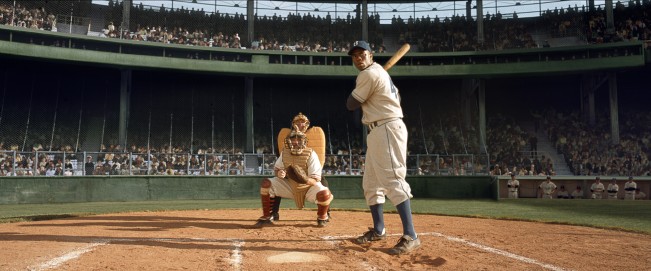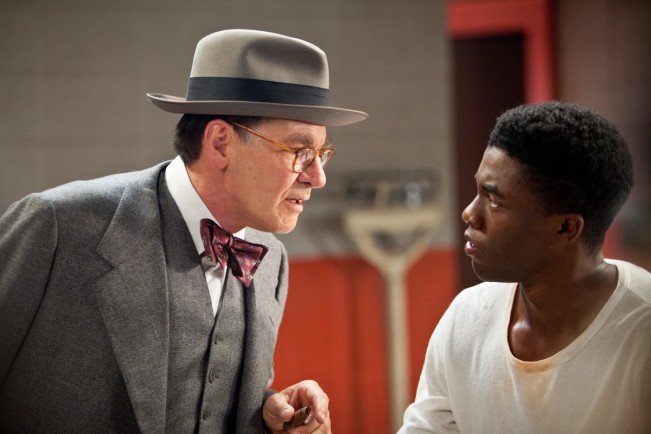

By Mike Wilmington Wilmington@moviecitynews.com
Wilmington on Movies: 42
42 (Three and a Half Stars)
U.S.: Brian Helgeland, 2013
“42” was the number that Jackie Robinson wore when he broke professional baseball’s ban against blacks playing on previously all-white teams after he was signed by the Brooklyn Dodgers.
And the movie 42 is the story, well-told and mostly true, of how Robinson (who is played by an admirable young actor named Chadwick Boseman) crossed that barrier, of what Jackie and his wife Rachel (Nicole Beharie) went through in the years covered (from 1945 to 1947), of how he stood up against taunts, jeers and verbal and physical abuse both on and off the playing field, and how he (and the people who chose him, supported him and played with him, finally ended the shameful history of racial prejudice that had blighted baseball since its earliest days—opening the door that thousands of African American players and other baseball players of color and other athletes in other sports have gone through ever since—a roster that includes many of the players I liked best when I used to follow the game as a kid, baseballers like Henry Aaron, Willie Mays, Minnie Minoso and Roberto Clemente.
It’s also the chronicle, filmed by writer-director Brian Helgeland, of a lesser-known hero named Branch Rickey. Rickey (Harrison Ford) was general manager of the Dodgers in 1945 and he was the executive who conceived and masterminded Robinson’s entry into the major leagues, handpicking him to be the player who took on the job of cracking the racial barrier, braved the abuse and blazed the trail—and who had to have the talent, toughness and temperament to survive it all.
Rickey was 65 when he chose Robinson (a multi-sport star at UCLA) and Robinson was 26 when he signed the contract, but the movie makes them a well-matched, intuitively-connected team (as do Boseman and Ford). Rickey, whom Ford plays as a tough old man with a gravelly voice and a dry, candid wit, comes across as a guy with lots of baseball savvy, but also with a burning sense of fair play and righteous indignation. Boseman plays Jackie as a tough, ambitious young kid with a similar send of justice and outrage, who wants to play and seizes the chance Rickey gives him.
The movie covers 1945 to 1947, which begin with Robinson still playing for the Negro leagues in Kansas City, and Rickey—far away in Brooklyn—cooking up his plan to integrate baseball, going through lists of the best black players in the Negro leagues, and trying to pick the young man he plans to put in a pressure cooker and make immortal. (Among Rickey’s other candidates were catcher Roy Campanella and the ageless master pitcher Satchel Paige, both of whom eventually made it to the “bigs” as well).
And we watch as Robinson, under Rickey’s protection and tutelage, goes from the Kansas City Monarchs to the Montreal Royals (a Dodger’s farm team) and finally to the Ebbets Field stomping grounds of “Dem Bums” (the Dodgers) — all the while having to cope with the hostility of other teams, segregation/isolation while traveling through the South, physical threats, and the hostility of some of his teammates as well — with some of the Dodgers drawing up a petition against playing with him. The most disturbing of the scenes of racism, all completely convincing, is the Movie’s heckling session and grinning torrent of six-letter words (all the same word, beginning with “n”) poured on Jackie by Phillies manager Ben Chapman, played with utterly believable malice and a chillingly offhand ease by actor Alan Tudyk.
Jackie Robinson played himself in the 1950 bio-movie The Jackie Robinson Story, with mixed results. (The Hollywood Reporter though, predicted a possible movie career for him — which is something that actually happened for the young actress who played Rachel Robinson, Ruby Dee.) Boseman endows Jackie with a greater sense of quietude and an inner turbulence tightly contained. We can accept Boseman’s Jackie as a great athlete (a lot of acre great care has gone into the actor duplicating Robinson’s special playing style and mannerisms ) and also as a charismatic and determined figure — matched, every step of he way, by Beharie as Rache
As Ford plays him — and it‘s one of his best recent performances — Rickey is clearly acting out of pure conviction, a sense of justice and outrage. Rickey, who had seen racism in action all his career, simply felt that black players were getting a raw deal, and he wanted to right some of those wrongs. But he was also acting out of enlightened self-interest, Rickey knew, as a canny baseball man, that a lot of first-rate talent was being ignored and wasted. He wanted both to improve his team and to improve America — and he ultimately did both.
The Dodgers, after all were no desperate, floundering team looking for a gimmick to create controversy and draw crowds.. They had finished second in the National League pennant race the year before (To St. Louis) and they had star players — including shortstop Pee Wee Reese (Lucas Black), pitcher Ralph Branca (Hamish Linklater), Dixie Walker (Ryan Merriman.) and second baseman Eddie Stanky (Jessie Luken) — as well as perhaps the most colorful manager then in (or out of) the sport, Hollywood ladies‘ man (he was married to actress Laraine Day), Leo Durocher (Christopher Meloni) — the hard-boiled dugout philosopher who coined the phrase “Nice guys finish last.”
These Dodgers were among the elite units in baseball, but they were also cursed with their own share of prejudice (Walker was among the players who circulated that a petition), yet also blessed with tolerance and anti-bigotry as well. Branca, Stanky, Durocher (who had to miss the season, after pressure group objections to his private life) and Reese were among Jackie’s allies. And Reese, in real life, was responsible for a gesture that became legendary, and that makes for the movie’s single most moving moment — when a crowd jeers Robinson (as was usual in his early major league days) and Pee Wee (who hailed from Kentucky) walks over to his teammate, puts his arm around Jackie’s shoulders, and looks out quietly but firmly at the abusive crowd.
I liked 42, I liked the performances, including fine turns by John McGinley as the elegant sports announcer Red Barber and Andre Holland as another reporter and Jackie‘s guide, Wendell Smith). Moments like the scene with Robinson and Reese — which you just don’t see in most new movies (at least done that convincingly) — are a big part of the reason why.
The movie also tends to right a different kind of cultural injustice. Everybody who knows baseball (nd many who don’t) have heard of Jackie Robinson and the barriers he broke down. Relatively few people outside baseball insiders, followers and fans have head of Branch Rickey — and I’d bet that most of he young audiences that the studios keep trying to lure into the theaters, haven’t heard of Branch Rickey and know very few details of this story — though these days, Google and Wikipedia may have whittled down that number.
Writer-director Helgeland is no softie. As either writer or as writer-director, he’s been a specialist in tough, knowing neo-noirs — ranging from, as scenarist, the excellent Mystic Rider and the even better L. A. Confidential (which won him a best screenplay Oscar) to, as writer director, the putridly violent and brutal Point Blank remake (with Mel Gibson) Payback. 42, in his hands, is not overly sentimental or flaccidly heart-tugging. But he’s no automatic hard-edged cynic either. 42 is emotional and, at times, inspiring. Helgeland tells it will, with feeling for the characters, especially Jackie and Rickey: for hat they meant to their time and ours, to baseball and to all of us.
I don’t follow baseball any more — though I once followed many sports avidly. The Mark McGwire-Sammy Sosa homer race and its aftermath helped kill my enthusiasm. I‘ve rarely picked up a sports page in baseball season since. But I would have been happy as a hot dog and a Coke in old Ebbets Field to follow the Jackie Robinson story — excuse me, the Jackie Robinson and Branch Rickey story — as it unfolded in 1945-47 and as it’s told here. Sometimes, it’s good to have a hero or two.















